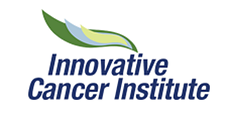Lung Cancer Radiation Therapy
Lung cancer is the leading cause of cancer-related death in the USA, but early diagnosis and radiation treatment can help. At the Innovative Cancer Institute (CI) we provide you with the most advanced treatment options to achieve local control of the disease and in some cases, total eradication
Dr. Amendola and her staff at ICI, have extensive experience in the treatment of lung cancer. In a large number of patients radiotherapy is an excellent choice to treat and in some cases obtain complete cure. This is possible using the most advanced technologies, such as Radiosurgery with the Varian Edge. At ICI, we were the first free-standing facility in the U.S. to offer our patients the Varian Edge. The ICl team will configure a precise and effective treatment plan that accounts for tumor motion and protects nearby healthy structures reducing toxicity, allowing safe delivery of a higher dose of radiation in a shorter treatment time.
Lung Cancer Surgery without Surgery
Effective and advanced non-surgery treatments, such as Edge Radiosurgery should be considered when making treatment decisions. Today, radiosurgery is considered the first line of treatment for early stage lung cancer and is the standard of care for early inoperable lung cancer.
SBRT, or stereotactic body radiation therapy, is also known as radiosurgery. Despite the use of the word “surgery” in its name, radiosurgery does not involve removing the tumor in an operating room using a surgical knife nor anesthesia or hospitalization. Radiosurgery uses X ray of high intensity and special software that allows radiation to penetrate deep into the body without touching normal tissues.
The non-surgical treatment technique we offer at Innovative Cancer Institute differs from conventional lung cancer radiation therapy in one important way: rather than having treatment five days a week for several weeks, radiosurgery is delivered in a few very radiation doses given in 1-3 or 5 sessions, with excellent tolerance and less complications since it only targets the tumors using special image guided support.
Advantages of EDGE Radiotherapy
- Shorter Treatment Time
- Non-Invasive procedure (no incisions)
- No hospital stay
- Rapid return to normal activities
Facts about Lung Cancer
- Each year more than 170,000 Americans are newly diagnosed with lung cancer.
- Cigarette smoking is the biggest risk factor in the development of lung cancer.
- The 5 year survival rate for lung cancer in general is less than 15% lagging far behind that of other cancers. The 5 year survival rate for early stage is approximates 70%.
- More people die from lung cancer than from breast cancer, prostate cancer, colon cancer, and pancreatic cancer combined.
- Smokers and others at high risk for lung cancer such as asbestos exposure should consult their physicians for appropriate prevention and early detection procedures.
Keep in mind statistics do not necessarily reflect the specifics of an individual experience. Cancer statistics are based on the total population and are compiled for groups with early stage through late stage disease.
There are two main types of lung cancer, non-small cell lung cancer and small cell lung cancer. These names refer to how a cancer looks under the microscope. Non-small cell lung cancer is the most common type of lung cancer and accounts for 84 percent of cases. There are different types of non-small cell lung cancer, including:
- Adenocarcinoma – a cancer that forms in the outer parts of the lung.
- Squamous cell carcinoma – a cancer that forms from a cell lining the airway.
- Large cell carcinoma – a kind of non-small cell lung cancer, but the cell it starts from may not be known.
Small cell lung cancer is less common and accounts for 16 percent of cases. Although the cells are small, they multiply quickly and can form large tumors that may spread throughout the body.
Lung Cancer Screening
Screening is recommended for people at high risk of getting lung cancer because of their smoking history and age. Ask your doctor if lung cancer screening is right for you. Lung cancer screening is not a substitute for quitting smoking.
Lung cancer screening has contributed to the success of detecting early lung cancer and also improves the cure rate. Low-dose CT screening should be recommended for those people with:
- Current or former smokers aged 55 to 74 years
- A smoking history of at least 30 packs per year
- No history of lung cancer
- Chest X-Ray is not recommended for the screening of lung cancer.
Care During Your Treatment
Cancer treatment can be difficult. You have many issues to cope with. Your oncology team, along with family and friends are available to help.
- Get plenty of rest during treatment, and don’t be afraid to ask for help.
- Follow your doctor’s orders. Your doctor may ask you to call if you develop a fever of 101° F or higher.
- Ask if you are unsure about anything. There are no stupid questions.
- Tell your doctor about any medications, vitamins or supplements you are taking to make sure they are safe to use during radiation therapy.
- Nutrition is important. Eat a balanced diet. Let your doctor know if you have trouble swallowing, food tastes funny or you have trouble eating.
- Treat the skin exposed to radiation with special care. Wear a shirt when you’re in the sun, avoid hot or cold packs, only use lotions and ointments after checking with your doctor or nurse, and clean the area with warm water and mild soap.
